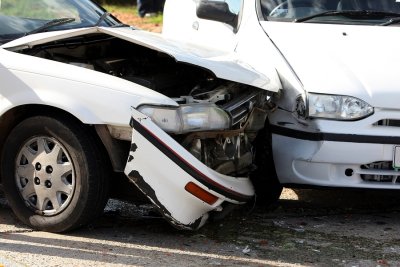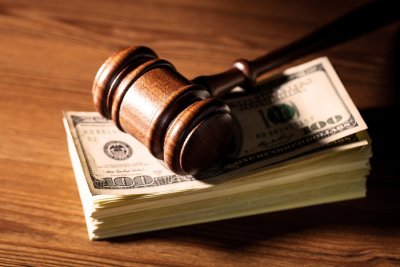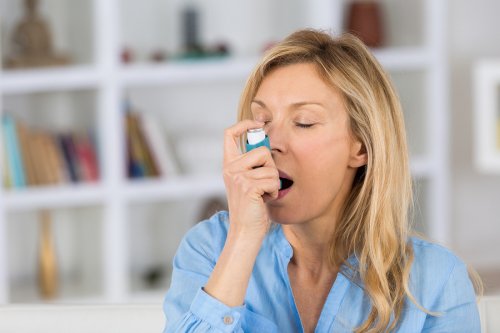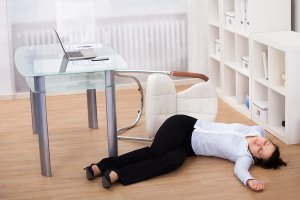-
Permanent Partial Disability and COVID-19 Part II
In Part I of this blog post, I gave a basic overview of permanent partial disability (PPD) benefits. So what kind of permanent partial disability benefits might someone who gets infected with COVID-19 at work expect to receive? Permanent partial disability benefits usually involve lasting physical effects. I found at least one news article describing COVID-19 as having possible permanent respiratory effects (such as permanent lung scarring or fibrosis), as well as possible lasting cognitive effects, although there is not yet enough data to reach definite conclusions.[1] There is also a discussion of COVID-19 causing issues with blood clotting, stroke, and heart problems.[2]
Let’s say that an injured worker (Izzy) suffers lung fibrosis as a result of work-related COVID 19. The lungs are considered part of the “body” for PPD purposes. An injury to the body allows someone to receive a maximum of up to 500 weeks of PPD payments. Izzy goes to one independent medical evaluation and that doctor says he’s suffered a 20% permanent impairment of his respiratory function as a result of COVID 19. The insurance company sends Izzy to their independent medical evaluator, and that doctor rates him as 10% permanently injured.
At this point, Izzy would likely go to a hearing[3] and a Workers’ Compensation Commissioner would review both physician reports as well as listen to Izzy testify about what symptoms he’s still having, such as difficulty breathing or pain in his chest. At that point, the Commissioner would assign a percentage of permanent impairment to Izzy’s lungs. That number is very important. In the Workers’ Compensation system, we speak of different “tiers” of payments. If someone is awarded less than 75 weeks of payments, they receive payment at the Tier one rate, which is 1/3 of their average weekly wage up to a statutory maximum. If the person receives 75 weeks or more of payments, they receive the higher Tier two payment rate, which equals 2/3 of their average weekly wage, up to a statutory maximum. The difference between receiving a Tier one rating vs. a Tier two rating means thousands of dollars for an injured worker.
In Izzy’s case, he wants to get an award of at least 15% from the Commissioner, because of 15% of a maximum possible of 500 weeks = 75 weeks. A 15% rating or above will get him the Tier two rate. Any rating lower than 15% will get him the Tier one rating. Much rides on the ratings of the different doctors as well as how Izzy communicates his symptoms to the Commissioner.
Physical effects are not the only ones that may be relevant. Workers’ Compensation in Maryland also at times allows someone to be compensated for psychological harm incurred as a result of an incident at work.
I think it’s important to keep in mind that there are two classes of individuals who may claim psychological harm as a result of COVID-19: those who actually become infected with the disease, and those who have to work in the incredibly difficult circumstances of healthcare clinics with high rates of the disease.
As to the first group of individuals, those who actually become infected with COVID-19: the Courts in Maryland do recognize psychological harm as something that can arise out an “accidental personal injury” that one suffers at work. Belcher v. T. Rowe Price, 329 Md. 709 (1993) is a case in which Maryland’s highest courts examined the concept of psychological harm in the workers’ compensation cases. In that case, the claimant was at work when a huge construction beam came crashing through the roof. Although she was not physically harmed, she suffered psychological detriments. This is what the Courts deem a “mental-mental” situation: a mental stimulus (the fear of the crashing beam) induces “mental” suffering. The Court held that claimants could seek Workers’ Compensation benefits for psychological injuries, as long as the mental harms were induced by a “sudden or violent” event, and that the psychological harms were capable of objective determination.
COVID-19 is a bit different, in that the anxiety an infected person suffers is not a “mental-mental” event, but rather a “physical-mental” event: a “physical” cause (infection of one’s body with a disease” provokes possible “mental” effects (anxiety, depression, etc.) It remains to be seen whether the Commission and Courts will apply the same standard of requiring a “sudden and violent” accident to induce the psychological harms, or whether perhaps the law will be more lenient in the case of COVID-19, where definite physical harm is suffered.
The second class of workers who may be entitled to benefits are healthcare workers who perhaps were not infected themselves, but had to show up to work day in and day out during the pandemic and deal with the incredibly difficult scenario of treating COVID 19 patients and perhaps watching many of those patients lose their lives in a very painful way. The Court of Appeals has recognized that post-traumatic stress disorder (PTSD) can be a compensable “occupational disease” for workers’ compensation purposes in certain situations. The key case is Means v. Baltimore County, 344 Md. 661 (1997). That case involved a paramedic who through the course of her work was exposed to several “gruesome” accident scenes and eventually developed PTSD as a result. The Court held that PTSD may be a compensable occupational disease if: 1) the employment is of such a nature that the risk of PTSD is a hazard of that particular employment, and 2) the PTSD is contracted as the result of an in the course of employment and causes the employee to become incapacitated.
There’s certainly an argument to be made that healthcare workers who develop PTSD based on what they experienced through the pandemic may have a valid occupational disease claim. One hurdle is that, traditionally, the occupational disease must develop in a “slow and insidious” manner. The pandemic has only lasted a few months so far, and it’s unclear how long it will go on for. It may not last for a long enough time to allow for “slow and insidious” development of PTSD, although that may be an issue that needs to be litigated.
Please call us at 410 787 0022 to discuss work-related COVID-19 or any other question you may have about workers’ compensation in Maryland.
- 1. George Citroner. What We Know About The Long-Term Effects of Covid-19. Healthline. April 21, 2020. https://www.healthline.com/health/coronavirus-covid-19
- 2. Mark Terry. Unexpected Cause of Death in Younger Covid-19 Patients is Related to Blood Clotting. Biospace. April 28, 2020. https://www.biospace.com/article/covid-19-increases-risk-of-heart-attacks-and-stroke/
- 3. However, it’s also possible that his case would be settled without having to go to a hearing
““
-
Permanent Partial Disability (PPD) Benefits and COVID-19, Part I: An Introduction to PPD
When someone in Maryland is injured on the job, the Workers’ Compensation statute allows that person to receive certain benefits. Those benefits include Temporary Total Disability (TTD) payments, which provide for two-thirds of the person’s average weekly wage during the time the person is totally unable to work due to the work accident. Another class of benefits is the payment of all causally-related medical costs by the employer or workers’ compensation insurer.
When someone in Maryland is injured on the job, the Workers’ Compensation statute allows that person to receive certain benefits. Those benefits include Temporary Total Disability (TTD) payments, which provide for two-thirds of the person’s average weekly wage during the time the person is totally unable to work due to the work accident. Another class of benefits is the payment of all causally-related medical costs by the employer or workers’ compensation insurer. The third class of benefits is what is referred to as Permanent Partial Disability (PPD) benefits. Oftentimes when someone is hurt, they will go through a course of treatment, which could include surgery, therapy, medications, or whatever other medical treatments are necessary to restore them to good health. However, many times, even after the person has gone through treatment and achieved what is known as Maximum Medical Improvement (MMI), the person will still experience some degree of lingering symptoms or issues as a result of the work accident. PPD benefits are designed to compensate for those.
A typical example would be someone who breaks a bone in their hand while at work. Let’s say that person undergoes surgery and the course of occupational therapy which allows them to get back to work after six months. However, the person still experiences ongoing numbness, tingling, weakness, and/or loss of range of motion in the affected hand. Most likely the person will always have some degree of lasting effects due to the injury.
At this stage, the person should be “rated” for their level of permanent impairment. Usually, at least two doctors will rate a workers’ compensation claimant as to the degree of personal injury: one physician that is contracted by the injured worker or his/her attorney, and one physician by the employer/insurer’s physician. Not surprisingly, the claimant’s doctor will usually provide a higher disability rating than the employer/insurer physician. After that, the two sides will either work out a settlement agreement as to the level of permanent damage, or they will go to a hearing in which a Workers’ Compensation Commissioner will review the medical reports and hear the testimony of the worker as to what ongoing issues are still being experienced. Then the Commissioner will assign a rating to the person’s permanent injuries.
Each body part in Maryland is assigned a different total number of weeks of permanent partial disability benefits. For example, to use our imaginary situation of an injured hand, the maximum number of weeks of permanent partial disability that someone can receive for a hand is 250 weeks of payments. Now let’s say that our injured worker goes to a hearing, and the Commissioner decided that he has suffered a 10% permanent loss of use of his hand due to the work accident. To figure out how much money the person would receive, we would multiply 10% x 250 possible weeks x one-third of the person’s average weekly wage. In 2019, the maximum weekly payment that someone could receive for a 10% hand injury would be $187.00/week.
10% x 250 weeks x $187.00 = $4,675.00 in payments paid over the course of twenty-five weeks.
I hope that example was not too complicated. To summarize, there are several factors that come into play when determining PPD: what part(s) of the body were injured; how badly injured they were, based on independent medical evaluations; and what the person’s average weekly wage was at the time of the injury. How does this apply to COVID-19? I will address that in Part II.
““
-
How Does Another Driver’s DUI Impact Your Accident Claim?
Car accidents occur around the Baltimore area every day. Unfortunately, many of them are caused by reckless drunk drivers who jeopardize the safety of everyone else on the road because of their irresponsible decisions. If you survived a car accident caused by a drunk driver, you should consult an injury lawyer right away. You shouldn’t have to pay for damage inflicted by someone else. Any claim or lawsuit that your injury lawyer files on your behalf will proceed entirely separately from criminal charges against the other driver.

Negotiating a Just Settlement
Drunk drivers cost their insurance carriers big bucks. Because insurance companies know that juries almost always find in favor of the plaintiff in these cases, these companies are usually quite willing to settle the case. However, the insurance carrier’s idea and your idea of a just settlement may be fairly disparate. It can take some back-and-forth negotiations between your injury lawyer and the insurance company to reach a fair settlement. Remember to keep your lawyer updated with any changes in your health status. If you require additional surgery, are diagnosed with another medical problem, or otherwise experience a change in your health, this will affect the settlement negotiations.
Deciding to Take a Settlement
Your lawyer can offer advice on whether or not a settlement offer is fair in light of your losses. However, only you can decide whether to agree to settle the case or not. There’s no need to rush to a decision. If you do agree to the settlement, you cannot later change your mind. However, you could decline the settlement and then reconsider a settlement at a later date, assuming that the other party is still willing to settle.
Going to Trial
If a fair settlement offer is not forthcoming, it’s time to talk to your lawyer about the merits of taking the case to trial. In civil lawsuits, drunk drivers are nearly always held liable for the damages they inflict. However, you will have to be prepared to testify and have your medical records scrutinized. Your lawyer will guide you through each step of the litigation process.
-
Is Your Accident Settlement Offer Too Low?
Even if you have been involved in a previous car accident in the Baltimore area, you may find it overwhelming to deal with the many details of securing compensation. It’s a good idea to speak with an injury lawyer even if you aren’t sure whether you will file an accident injury lawsuit. Your lawyer has plenty of experience dealing with insurance carriers. He or she will help you secure a generous accident settlement.

Initial Offer
It’s to be expected that the first accident settlement offer you receive will be the lowest amount that the insurance adjuster is authorized to offer. Insurance is a business and, as with any business, the insurance adjuster’s goal is to improve the company’s bottom line. Unfortunately, far too many car accident survivors take the first offer they get because they’re unaware that it’s negotiable or because they lack negotiating skills. This is another benefit of hiring an injury lawyer; he or she knows the most effective strategies to use to negotiate with the insurance adjuster.
Medical Expenses
Before deciding whether subsequent settlement offers are too low, you’ll need an estimate of your losses. Calculating your losses can be more difficult than you might think, but your lawyer can handle this task for you. The settlement offer should be substantial enough to fully cover your out-of-pocket medical costs such as diagnostic tests, surgeries, hospitalization, physical therapy sessions, and pharmacy co-pays. Depending on the nature and extent of your injuries, you might also require durable medical equipment and perhaps the services of a home health aide when you leave the hospital.
Property Damage
Your vehicle may have sustained minor damage or it might be a total loss; either way, you deserve full compensation for the damage. The settlement offer should be high enough to restore your car to the condition that it was in prior to the crash. If the vehicle was a total loss, your lawyer will ask for a settlement offer that includes the fair market value of the car. Your settlement offer might even include your rental car or other transportation costs that you incurred after the crash. Keep in close contact with your lawyer throughout the process and advise him or her of any new expenses you incur.
-
What Is Occupational Asthma?
Asthma is a chronic, inflammatory condition that affects the airways and causes trouble breathing. Periodically, the inflammation can become significantly worse in a flare-up called an asthma attack. There are different types of asthma, including occupational asthma, which is a disease triggered by a workplace. If your doctor informs you that you have asthma and you suspect your job may be to blame, talk to a workers’ comp attorney in Baltimore right away. Under workers’ comp law , your medical treatment may be covered and you may be entitled to receive additional benefits.
Your workers’ comp lawyer may ask to see your medical records, which might indicate whether you have work-aggravated asthma or true occupational asthma. Work-aggravated asthma refers to pre-existing asthma that is worsened by conditions in the workplace. True occupational asthma originates directly from the workplace. Jobs that require exposure to chemical irritants or sawdust, for example, can irritate the airways. A workers’ comp lawyer can make sure your employer follows all the necessary steps to protect employees, such as implementing a health surveillance program and establishing effective irritant control measures.

-
Answers to Your FAQs About Workers’ Compensation Claims
Did you know that workers’ compensation is the oldest type of social insurance in the U.S.? In fact, it’s mandatory for employers to provide coverage to employees. If you think you might need to apply for benefits, a workers’ compensation law firm serving Baltimore can give you the answers to all of your questions. Since there are time limits to file a claim, consult a workers’ compensation attorney serving Glen Burnie as soon as possible after you have sustained an injury.
Who Is Eligible for Workers’ Compensation?
Workers’ compensation is not administered on a federal level; the programs vary from state to state. This is one reason why it’s essential to work with a workers’ compensation attorney to ensure you’re eligible for benefits. You could be eligible for benefits if you’re an employee of a company, rather than an independent contractor. If you run a sole proprietorship, your business must purchase workers’ compensation insurance. The same is true if you’re involved in a partnership.

What Types of Injuries are Covered?
Your workers’ compensation attorney will review your medical records and investigate the case to determine if your medical problems are covered. Health conditions must be related to your job for you to receive benefits. In some cases, the connection is clear, such as if you slip and fall at work due to hazardous conditions and sustain a fracture. However, other types of job-related health issues can also be covered, such as carpal tunnel syndrome due to repetitive movements at work or a respiratory infection due to poor air quality.
What Type of Benefits Can I Receive?
Your workers’ comp attorney may file a temporary disability claim or a permanent disability claim on your behalf. If your temporary disability claim is approved, you’ll receive a percentage of your wages while you’re out of work. For example, if you’re unable to work at all on a temporary basis, you’ll receive two-thirds of your average weekly income. If your permanent disability claim is approved, you’ll receive compensation for a set number of weeks. In addition to compensation for lost wages, you can receive compensation for your medical expenses and hospitalization. For example, medications, prosthetic appliances, crutches, and surgery costs could be covered. Your workers’ compensation attorney may also help you obtain vocational rehabilitation benefits, which may consist of vocational assessment, counseling, and job placement.
-
Is COVID 19 better classified as an “accidental personal injury?”
A few weeks ago I wrote a piece discussing whether or not someone who contracts COVID-19 while at work has contracted an “occupational disease” for which he or she could receive workers’ compensation benefits. As I mentioned in that article, COVID-19 presents novel legal questions. In this article, I will consider whether or not COVID-19 is perhaps better-defined as an “accidental personal injury.”
Accidental personal injuries are probably what most people think about when they first think of workers’ compensation. An accidental personal injury is, for the most part, exactly what it sounds like: some injury that a person suffers by chance, while at work. The range of possible accidental personal injuries is endless. Some examples include: straining a muscle while lifting something heavy; suffering a laceration while operating machinery; or breaking a bone by falling from a height. These are some of the typical accidental injuries that arise while people are at work.
The statutory definition of accidental personal injury is found in MD Code Labor and Employment Section 9-101(b):
- Accidental personal injury. — “Accidental personal injury” means:
- an accidental injury that arises out of and in the course of employment;
- an injury caused by a willful or negligent act of a third person directed against a covered employee in the course of the employment of the covered employee; or
- a disease or infection that naturally results from an accidental injury that arises out of and in the course of employment, including:
- an occupational disease; and
- frostbite or sunstroke caused by a weather condition.
At first glance, one might consider subsection (3), which mentions disease or infection, as possibly encompassing COVID-19. However, the plain language of the subsection goes on to state that only diseases or infections that “naturally result from an accidental injury” are to be classified as accidental personal injuries. In other words, the disease or infection must be secondary to some more typical physical injury. An example might be someone at work who suffers a seemingly minor scratch on their hand. If the scratch becomes infected and causes more serious health issues, those issues would be considered an accidental personal injury pursuant to subsection (3).
As I discussed in my prior piece, the traditional concept of an occupational disease is one that develops over a long period of time due to exposure to some workplace condition. While COVID-19 takes a few weeks to “incubate,” that is not really the type of “slow and insidious” development traditionally associated with occupational diseases. Therefore, perhaps it makes more sense to classify COVID-19 infection as an “accidental personal injury.”
Maryland’s highest court, the Court of Appeals, examined the parameters of “accidental personal injury” in the case of Belcher v. T. Rowe Price, 329 Md. 709 (1993). That case involved a woman who was sitting at her desk when a huge construction beam came crashing through the ceiling very close to her. Thankfully, she was not physically harmed, but she suffered significant psychological effects from this frightening and traumatic experience. A full discussion of this case is not on point for this article, because COVID-19 is of course a physical illness, not a psychological one. However, the case is relevant because the Court examined in depth the definition of what constitutes an “accidental personal injury.”
The Court wrote: “…[T]he physical injury need not be caused by physical impact or harm directly to the body but may be the result of a nervous shock. Furthermore, the injury need not be externally apparent, but may be to the internal structure of the body, as for example, cerebral hemorrhage, apoplexy, heart failure or paralysis. The symptoms of injury need not be immediately apparent but may follow the accident by some lapse of time.”
I believe that the Court’s analysis in Belcher provides for the possibility of defining COVID-19 as an accidental personal injury. The physical injuries arising out of COVID-19 are not due to an immediately traumatic experience at the macro level, such as a twisted ankle or broken bone. However, there is some physical interaction that occurs whereby the virus cells interact with and infect the host’s lung cells. This is certainly more than a mere “nervous shock” and should be considered a “physical injury.”
Secondly, the damage caused by COVID-19 is to the “internal structure” of the body, which again is allowable pursuant to the Belcher analysis of accidental personal injuries.
Finally, the symptoms of COVID-19 may not arise immediately, but only after some period of incubation. This factor as well does not appear to be problematic according to the language from Belcher that I quoted above.
All in all, I think there are arguments to be made, based on the statutory definitions and case law, that COVID-19 can constitute an occupational disease, an accidental personal injury, or both. It remains to be seen how the Workers’ Compensation Commission and the courts of Maryland define the disease.
Please feel free to call us at 4107870022 if you have any questions about COVID-19 as it pertains to a possible workers’ compensation claim, or any other question related to workers’ compensation in Maryland.
- Accidental personal injury. — “Accidental personal injury” means:
-
What to Do If You’re Injured at Work
Employees are afforded certain legal protections, such as the right to receive compensation if they become injured while on the job. However, for your claim to be successful, you must follow your state’s workers’ compensation guidelines. Since the guidelines vary from state to state, you should contact a workers’ compensation attorney as soon as possible. A workers’ compensation attorney near Baltimore can help you receive maximum compensation so that you can focus on your recovery.
Seek Medical Help

After suffering a workplace injury, the most important step to take is to see a doctor as soon as possible. For certain types of workplace injuries, you may need an ambulance to take you to the nearest emergency room. For example, if you’ve been working with machinery and suffer a deep laceration or amputation, it’s necessary to call 911 promptly. Otherwise, you can inform your employer that you need to leave work early to receive medical attention for an injury sustained at the workplace. Even if your injury seems minor at first, it’s best to go to a doctor sooner, rather than later. This establishes a record of your injury, which your workers’ compensation attorney can use to back up your claim.
Provide Written Notification
You may be legally required to provide written notification to your employer within a certain period of time following the injury. If you do not follow your state’s guidelines, your workers’ compensation claim may be denied. Talk to an attorney at law in Glen Burnie about workers’ compensation guidelines in Maryland. Generally, written notification must include information pertaining to when the injury occurred, what type of injury it was, and how it developed.
Request Workers’ Compensation
After notifying your employer of the accident, your workers’ comp attorney can help you file a request for workers’ compensation. Deadlines generally apply to these types of claims. Your attorney can assist you by ensuring that the paperwork is in order and that you’ve attached any necessary documentation, such as your medical records. Your attorney can also provide representation at a workers’ compensation hearing if you are required to attend one.
RECENT POSTS
categories
- Uncategorized
- Worker's Compensation
- Attorney Fees
- Auto Accident Injury Whiplash
- Attorney Review
- Personal Injury
- Social Security Disability
- DUI
- Workplace Injuries
- Auto Accident
- Workers Compensation Claims
- Permanent Disability
- Infographic
- Drunk Driving
- Wrongful Death
- Works in Maryland
- Uninsured Motorists
- Motorcycle Crashes
